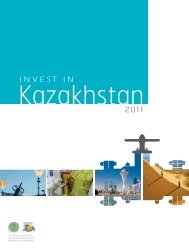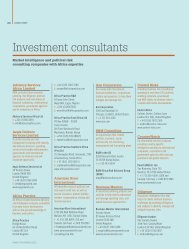NIGERIA Invest in 2012-13 - Newsdesk Media
NIGERIA Invest in 2012-13 - Newsdesk Media
NIGERIA Invest in 2012-13 - Newsdesk Media
Create successful ePaper yourself
Turn your PDF publications into a flip-book with our unique Google optimized e-Paper software.
of one gigawatt coal-fired power plants <strong>in</strong> the states of Enugu<br />
<strong>in</strong> the south-east, Kogi <strong>in</strong> the central region, and Gombe <strong>in</strong><br />
the north of the country. But it is renewable energy sources<br />
that have the potential to provide electricity to regions<br />
and communities where the grid either does not stretch,<br />
or rema<strong>in</strong>s underdeveloped.<br />
Water world<br />
Nigeria’s Renewable Energy Masterplan puts hydroelectric<br />
power at its centre. It aims to produce 5,930 megawatts (MW)<br />
from large hydro schemes <strong>in</strong> the medium term – by<br />
approximately 2015 – and 48,000 MW by about 2030, when<br />
19,000 MW will also be generated from small hydroelectric<br />
schemes to take electricity to smaller communities.<br />
By then, the total power output target is 192,000 MW,<br />
accord<strong>in</strong>g to the Energy Commission’s targets, with renewables<br />
contribut<strong>in</strong>g more than one third of that total.<br />
However, <strong>in</strong> order to deliver more than just one twentieth<br />
of that output, the country will need to <strong>in</strong>vest heavily <strong>in</strong> its<br />
power transmission and distribution network. When power<br />
output was <strong>in</strong>creased to 3,800 MW<br />
<strong>in</strong> August last year, the network struggled to handle even that<br />
modest load. The system also suffers from high energy losses,<br />
says Sambo, due to physical deterioration of transmission and<br />
distribution facilities, an <strong>in</strong>adequate meter<strong>in</strong>g system, and the<br />
loss of electricity – and revenues – as a<br />
result of power theft via illegal connections.<br />
That is partly why Nigeria is<br />
deregulat<strong>in</strong>g and privatis<strong>in</strong>g its electricity<br />
<strong>in</strong>dustry: <strong>in</strong> order to attract and facilitate<br />
private-sector and foreign expertise and<br />
<strong>in</strong>vestment across its whole<br />
power-generation <strong>in</strong>dustry.<br />
At the same time, organisations such<br />
as the Council for Renewable Energy <strong>in</strong><br />
Nigeria (CREN) are encourag<strong>in</strong>g the adoption of small-scale<br />
schemes, such as solar thermal and photovoltaic (PV) systems,<br />
for offices and homes. CREN has led by example by <strong>in</strong>stall<strong>in</strong>g<br />
PV solar <strong>in</strong> its Cross River State chapter offices to demonstrate<br />
how solar can provide power off-grid, and demand for<br />
microgeneration has encouraged the establishment of a<br />
plethora of solar-power <strong>in</strong>stallation companies across Nigeria.<br />
F<strong>in</strong>anc<strong>in</strong>g options<br />
One of the major advantages of <strong>in</strong>vestment across the whole<br />
power sector – not just renewables – is the f<strong>in</strong>anc<strong>in</strong>g available.<br />
National export credit agencies (ECAs) are especially keen to<br />
f<strong>in</strong>ance whole projects, not just the hardware, such as<br />
turb<strong>in</strong>es. The Export-Import Bank of the United States<br />
(US Ex-Im Bank), for example, has pledged back<strong>in</strong>g for<br />
$1.5 billion of US goods and services across the whole<br />
Nigerian energy sector <strong>in</strong> a memorandum of understand<strong>in</strong>g<br />
signed <strong>in</strong> October 2011.<br />
“$1.5 billion is just the start. We want to deploy this<br />
f<strong>in</strong>anc<strong>in</strong>g as quickly as possible to help meet President<br />
Goodluck Jonathan’s goals for grow<strong>in</strong>g the Nigerian<br />
economy by greatly expand<strong>in</strong>g the availability of power <strong>in</strong><br />
the country,” said US Ex-Im Bank chairman and president<br />
Fred P Hochberg. He added: “We are also <strong>in</strong>terested <strong>in</strong><br />
f<strong>in</strong>anc<strong>in</strong>g US exports <strong>in</strong> support of Nigeria’s other<br />
<strong>in</strong>frastructure needs, which we understand may total<br />
over $220 billion between <strong>2012</strong> and 2016.”<br />
ENERGY 121<br />
Renewable energy<br />
Nigeria is not just attract<strong>in</strong>g US support. Canadian<br />
construction companies have also expressed an <strong>in</strong>terest <strong>in</strong><br />
partner<strong>in</strong>g on the proposed Mambilla and Gurara hydroelectric<br />
power projects, a move welcomed by Professor Bart Nnaji, the<br />
m<strong>in</strong>ister of power. Those two schemes are expected to jo<strong>in</strong>tly<br />
produce some 3,300 MW of electricity.<br />
In addition to support from ECAs, <strong>in</strong>vestors can<br />
also secure fund<strong>in</strong>g from the United Nations’ Clean<br />
One of the major advantages of<br />
<strong>in</strong>vestment across the whole power<br />
sector is the f<strong>in</strong>anc<strong>in</strong>g available<br />
Development Mechanism (CDM). This channels f<strong>in</strong>ance<br />
from developed countries’ carbon-emitt<strong>in</strong>g <strong>in</strong>dustries<br />
<strong>in</strong>to clean energy and development programmes<br />
across the emerg<strong>in</strong>g markets.<br />
That is partly how entrepreneur Obasiohia Benneth<br />
Ob<strong>in</strong>na hopes to f<strong>in</strong>ance ambitious plans for an<br />
energy-from-waste bus<strong>in</strong>ess. The aim is to help deal with some<br />
of the estimated 9,000 tonnes of waste generated every day <strong>in</strong><br />
Nigeria by burn<strong>in</strong>g it to produce power for Nigerian city<br />
neighbourhoods. A waste-management expert tra<strong>in</strong>ed <strong>in</strong> the<br />
UK, Ob<strong>in</strong>na is currently seek<strong>in</strong>g <strong>in</strong>vestors to back the bus<strong>in</strong>ess,<br />
which will be the first <strong>in</strong> Nigeria.<br />
INvEst IN <strong>NIGERIA</strong> <strong>2012</strong>-<strong>13</strong>







